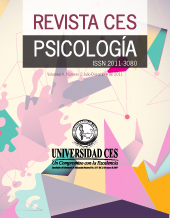Diseño de macro y metacontingencia para la promoción del comportamiento proambiental y urbano responsable
DOI:
https://doi.org/10.21615/cesp.14.1.4Palavras-chave:
Comportamiento Sostenible, Macrocontingencia, Metacontingencia, Psicología Ambiental, Cambio Cultural, Comportamientos Urbanos Responsables, Comportamiento ProambientalResumo
El objetivo de este trabajo teórico es introducir los conceptos de macrocontingencia y metacontingencia en el campo de la psicología ambiental y su papel en la promoción de acciones colectivas en pro del medio ambiente natural y construido. Se proponen este tipo de contingencias para el diseño de prácticas culturales y programas sociales que ayuden a resolver problemas ambientales como el cambio climático, la extinción de especies, la contaminación del agua, la deforestación, las migraciones, el vandalismo, etc., e incentivar comportamientos urbanos responsables como el uso de la bicicleta y del transporte urbano, el reciclaje, etc. Aunque las acciones de cada persona pueden contribuir a las soluciones, el planteamiento del presente manuscrito se centra en el efecto acumulativo y las acciones entrelazadas de los individuos que producen un resultado eficaz para el bienestar de muchas personas y del medio ambiente. La conducta guiada por reglas se presenta como el mecanismo de aprendizaje para introducir las macrocontingencias y metacontingencias en la comunidad. A partir del pragmatismo como visión paradigmática, se discute la efectividad de las macrocontingencias y metacontingencias para explicar los procesos culturales en la promoción de acciones efectivas para el medio ambiente.
Downloads
Referências
Ajzen, I. (2005). Attitudes, Personality and Behaviour; Open University Press (Second Edition). Mc Graw Hill Education.
Ajzen, I. (1991). The theory of planned behavior. Organizational Behavior and Human Decision Processes, 50(2), 179-211.
Ajzen, I., & Fishbein, M. (1973). Attitudinal and normative variables as predictors of specific behavior. Journal of Personality and Social Psychology, 27(1), 41–57. https://doi.apa.org/doiLanding?doi=10.1037%2Fh0034440
Altman, I., & Rogoff, B. (1987). World views in psychology: Trait, interactional, organismic, and transactional perspectives. In D. Stokols & I, Altman (Eds.), Handbook of Environmental Psychology. Vol. 1 (pp. 7-40). Wiley.
Bachman, W., & Kattzev, R. (1982). The effects on non-contingent free bus tickets and personal commitment on urban bus ridership. Transportation Research, 16A, 103-108.
Barazarte, R., Neaman, A., Vallejo, F., & García, P. (2014). El conocimiento ambiental y el comportamiento proambiental de los estudiantes de la Enseñanza media, en la Región de Valparaíso (Chile). Revista de Educación, 364, 12-34. http://dx.doi.org/10.4438/1988-592X-RE-2014-364-255
Barker, R. G. (1978). Habitats, environments, and human behavior: studies in ecological psychology and eco-behavioral science from the Midwest Psychological Field Station, 1947-1972. Jossey-Bass.
Catania, A. C., Shimoff, E., & Matthews, B. A. (1989). An experimental analysis of rule-governed behavior. In S. C. Hayes (Ed.), Rule-governed behavior: Cognition, contingencies, and instructional control (pp. 119-150). Plenum Press. https://doi.org/10.1007/978-1-4757-0447-1_4
Chapman, C., & Risley, T.R. (1974). Anti-litter procedures in an urban high-density area. Journal of Applied Behavior Analysis, 7(3), 477-384. https://doi.org/10.1901/jaba.1974.7-377
Cialdini, R. B., Reno, R. R., & Kallgren, C. A. (1990). A focus theory of nonnative conduct: Recycling the concept of norms to reduce littering in public places. Journal of Personality and Social Psychology, 58(6), 1015-1026. http://dx.doi.org/10.1037/0022-3514.58.6.1015
Corral-Verdugo, V. (2002). Psicología de la Conservación: El estudio de las conductas protectoras del ambiente. En V. Corral Verdugo (Ed.). Conductas protectoras del Ambiente. CONACYT-UniSon.
Corraliza, J., & Collado, S. (2011). La naturaleza cercana como moderadora del estrés infantil. Psicothema 23(2), 221-226.
Geller, E. S. (2002). The Challenge of social change: A Behavioral Scientist’s Perspective, Social Marketing Quarterly, 8(2), 15-24 https://doi.org/10.1080/15245000212551
Geller, E. S. (1987). Applied Behavior Analysis and Environmental Psychology: From Strange Bedfellows to a Productive Marriage. In D. Stokols & I. Altman (Eds) Handbook of Environmental Psychology. John Willey & Sons.
Geller, E.J., Winett, R.A., & Everett, P.B. (1982). Preserving the environment: New strategies for behavior change, Journal of Leisure Research, 14(4), 365–366. https://doi.org/10.1080/00222216.1982.11969535
Gifford, R. (2014). Environmental Psychology Matters. Annual Review of Psychology, 65(1), 541–579. http://doi.org/10.1146/annurev-psych-010213-115048
Gifford, R., & Sussman, R. (2012). Environmental attitudes. In S. D. Clayton (Ed.), Oxford library of psychology. The Oxford handbook of environmental and conservation psychology (pp. 65–80). Oxford University Press. https://doi.org/10.1093/oxfordhb/9780199733026.013.0004
Glenn, S. (2004). Individual Behavior, Culture, and Social Change. The Behavior Analyst, 27(2), 133-151. https://doi.org/10.1007/BF03393175
Glenn, S. (2003) Operant contingencies and the origin of culture. In K.A. Lattal & P.N. Chase (Eds.), Behavior theory and philosophy (pp 223-242). New York: Klewer Academic/Plenum. https://doi.org/10.1007/978-1-4757-4590-0_12
Glenn, S. (1998). Contingencies and Metacontingencies: Toward a Synthesis of Behavior Analysis and Cultural Materialism. The Behavior Analyst, 11(2), 161-179. doi: 10.1007/BF03392470
Glenn, S. (1991). Contingencies and meta-contingencies: Relations among behavioral, cultural, and biological evolution. In P. A. Lamal (ed.), Behavioral Analysis of Societies and Cultural Practices (pp. 39-73). Hemisphere Press.
Glenn, S., Malott, M., Andery, M. A. P. A., Benvenuti, M., Houmanfar, R., Sandaker, I., …Vasconcelos, L. (2016). Toward consistent terminology in a behaviorist approach to cultural analysis. Behavior and Social Issues, 25, 11–27. https://doi.org/10.5210/bsi.v25i0.6634.
Harris, M. (1979). Cultural Materialism: The Struggle for a Science of Culture. Random House Eds.
Hayes, S. C. (1989). Rule-governed behavior: Cognition, contingencies, and instructional control. Plenum Press.
Houmanfar, R., & Rodrigues, N. (2006). The metacontingency and the behavioral contingency: Points of contact and points of departure. Behavior and Social Issues, 15, 13-30. https://doi.org/10.5210/bsi.v15i1.342
Lightwood J.M., Dinno A., & Glantz S.A. (2008). Effect of the California Tobacco Control Program on personal health care expenditures. PLoS Med 5(8), e178. https://doi.org/10.1371/journal.pmed.0050178
Machado, V.L.S., & Todorov, J.C. (2017). Crossing the Crosswalk: How to Make a City Walk the Line. Behavior and Social Issues 26, 200–203. https://doi.org/10.5210/bsi.v26i0.7933
Malott, M. E., & Glenn, S. S. (2006). Targets of intervention in cultural and behavioral change. Behavior and Social Issues, 15, 31-56. https://doi.org/10.5210/bsi.v15i1.344
Marques, N., Leite, F., & Lobato Benvenuti, M. (2012). Conceptual and Experimental Directions for Analyzing Superstition in the Behavioral Analysis of Culture. Es/Rlp, 44(1), 55-63. http://dx.doi.org/10.14349/rlp.v44i1.929
Ostrom, E. (2009). A behavioral approach to the rational choice theory of collective action. The American Political Science Review, 92, 1-22.
Olivos-Jara, P., Aragonés, J. I., & Navarro-Carrascal, O. (2013). Educación ambiental: itinerario en la naturaleza y su relación con conectividad, preocupaciones ambientales y conducta. Revista Latinoamericana de Psicología, 45(3), 503-513. http://dx.doi.org/10.14349/rlp.v45i3.1490
Orostegui, O. (s.f.). ¡Qué vuelva la cultura ciudadana! Bogotá cómo vamos. Recuperado el 4 de marzo de 2021 de https://bogotacomovamos.org/que-vuelva-la-cultura-ciudadana/
Páramo, P. (2017). The city as an environment for urban experiences and the learning of cultural practices. In G. Fleury-Bahi, E. Pol Urrutia, O, Navarro Carrascal (Eds). Handbook of environmental psychology and quality of life research (pp. 275-291). Springer.
Páramo, P. (2013) Comportamiento urbano responsable: las reglas de convivencia en el espacio público. Revista Latinoamericana de Psicología, 45(3), 473-485.
Páramo, P. (2010). Aprendizaje situado: creación y modificación de prácticas culturales en el espacio público urbano. Revista Psicología & Sociedade, 22(1), 130-138.
Páramo, P., & Contreras, M. M. (2018). Formación ciudadana en comportamientos urbanos responsables: etnografía rápida orientada a la convivencia en el espacio público urbano. Revista Cuadernos de Vivienda y Urbanismo, 11(22). https://doi.org/10.11144/Javeriana.cvu11-22.fccu
Páramo, P., & Páramo, J. (2016). Los comportamientos urbanos responsables del peatón. Fundación MAPFRE. https://www.fundacionmapfre.org/fundacion/es_es/images/los-comportamientos-urbanos-responsables-del-peaton_tcm164-127791.pdf
Revista Semana. (2016, junio 8). Bogotá. ¿El regreso de la cultura ciudadana de Mockus? Recuperado el 2 de marzo de 2021 de https://www.semana.com/agenda/articulo/cultura-ciudadana-antanas-mockus-enrique-penalosa/49130/
Ribes, E (1990). Psicología General. México: Trillas
Sandoval, M. (2012). Comportamiento sustentable y educación ambiental: una visión desde las prácticas culturales. Revista Latinoamericana de Psicología, 44(1), 181-196. http://dx.doi.org/10.14349/rlp.v44i1.943
Schultz, P. W., & Kaiser, F. (2012). Promoting Pro-Environmental Behavior. In S.D. Clayton: The Oxford Handbook of Environmental and Conservation Psychology. Oxford University Press. University Press. http://dx.doi.org/10.1093/oxfordhb/9780199733026.013.0029
Schwartz, S. H. (1977). Normative influences on altruism. In L. Berkowitz (Ed.), Advances in experimental social psychology, 10 (pp. 221-279). Academic Press.
Smith, G. S., Houmanfar, R., & Louis, S. J. (2011). The participatory role of verbal behavior in an elaborated account of metacontingency: From conceptualization to investigation. Behavior and Social Issues, 20, 122- 146. https://doi.org/10.5210/bsi.v20i0.3662
Todorov, J.C (2013). Conservation and transformation of cultural practices through contingencies and metacontingencies. Behavior and Social Issues, 22, 64-73. https://doi.org/10.5210/bsi.v22i0.4812
Todorov, J.C. (2010). Schedules of cultural selection: Comments on "Emergence and Metacontingency". Behavior and Social Issues, 19, 86-89. https://doi.org/10.5210/bsi.v19i0.3221
Uzzell, D. (1999). Education for environmental action in the community: New roles and relationships. Cambridge Journal of Education, 29(3), 397-413. https://doi.org/10.1080/0305764990290309
Van Houten, R., & Malenfant, J. E. L. (2004). Effects of a driver enforcement program on yielding to pedestrians. Journal of Applied Behavior Analysis, 37, 351-363. https://doi.org/10.1901/jaba.2004.37-351
Wilson, E.O. (1993). Biophilia: The human bond with other species. Harvard University Press.
Zandecki, E.M. (2012) The effects of informational prompts and performance feedback on recyclign behaviour. Graduate Theses and Dissertations. http://scholarcommons.usf.edu/etd/4265
Zilio, D. (2019). On the Function of Science: an Overview of 30 Years of Publications on Metacontingency. Behavior and Social Issues 28, 46–76 https://doi.org/10.1007/s42822-019-00006-x
Downloads
Publicado
Como Citar
Edição
Seção
Licença
Copyright (c) 2020 CES Psicología

Este trabalho está licenciado sob uma licença Creative Commons Attribution-NoDerivatives 4.0 International License.
Revista CES Psicología ISSN 2011 3080
Facultad de Psicología, Universidad CES Primera edición 2008. Última actualización Mayo 18 de 2022. Todos los derechos reservados. Hecho el depósito legal que exige la ley.
Se autoriza la reproducción total o parcial de los artículos citando la fuente y el autor. This publication may be reproduced by mentioning the source and the authors.
| Métricas do artigo | |
|---|---|
| Vistas abstratas | |
| Visualizações da cozinha | |
| Visualizações de PDF | |
| Visualizações em HTML | |
| Outras visualizações | |




